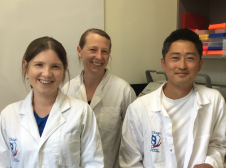 Drs Rosie Brown, Sharon Ladyman, and Joon Kim (left to right in photo) have been successful with their applications for this year's funding round of the Royal Society's Marsden Fund grants.
Drs Rosie Brown, Sharon Ladyman, and Joon Kim (left to right in photo) have been successful with their applications for this year's funding round of the Royal Society's Marsden Fund grants.
Dr Rosie Brown's project is titled “Rewarding Mum: hormones supporting maternal-infant interactions” ($960,000).
Rosie's work centres around maternal care for their offspring and for this project she specifically aims to find the structures and signalling processes in mother's brains which make caring for offspring rewarding. A rewarding stimulus is important for motivating sustained nurturing behaviour and this reward is also hypothesized to underpin the behavioural changes new mothers have to undergo in order to optimally care for their young.
The project will utilise two recent technical developments to assess reward circuitry activity, and to determine the key hormonal signals and neuronal populations required for maternal motivation. This research will provide novel insights into how hormones alter motivation to fundamentally change behaviour in new mothers.
Dr Sharon Ladyman's project is titled “Neurons to keep mums cool” ($939,000).
The healthy growth of a fetus requires tightly controlled body temperature of the mother, yet the increased metabolic heat generated by fetal growth is a challenge for the mother's body as it finds itself in the unusual situation to have to “cool for two”. Previous work in the lab has found that receptors for the pregnancy hormone prolactin are expressed on a small population of neurons in the brain which are capable of inducing a profound cooling of the body. This project will investigate whether interfering with the prolactin-signalling on these neurons will affect the pregnancy and will provide insight into the plasticity of thermoregulation. This may have important implications, for example for sustaining healthy pregnancy and good levels of milk production in warmer climates.
Dr Joon Kim's project is titled “How does stress cause anxiety?” ($360,000; fast-start grant for early career researchers).
Stress is one of the most commonly described contributing factors in the development of anxiety disorders; and yet, it is unknown how stress neural circuits in the brain control anxiety. The stress response is controlled by a population of neurons in the brain called corticotropin-releasing hormone (CRH) neurons. Joon's hypothesis is that increased activity of these neurons can gate anxiety states and he will investigate this using techniques in which he can both manipulate and record CRH neuron activity with light. This research will provide the first evidence of how CRH neural circuits affect anxiety and begin the foundations to understand how stress affects the mind.
